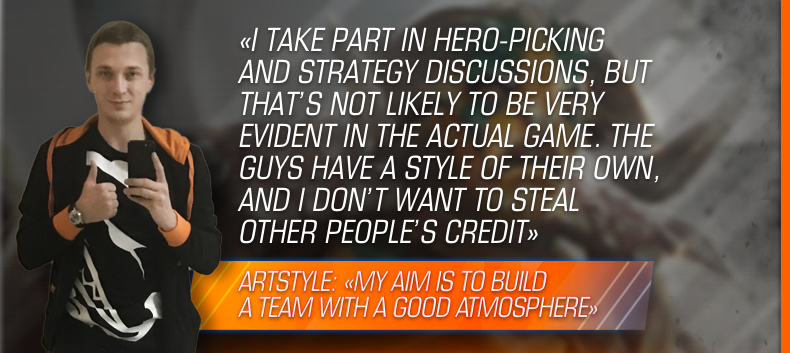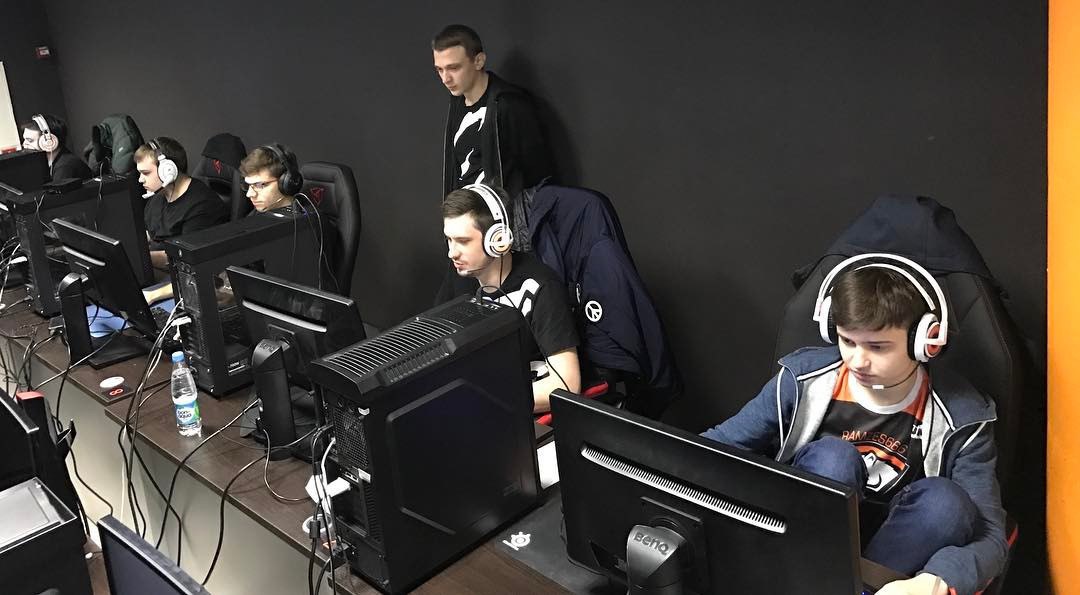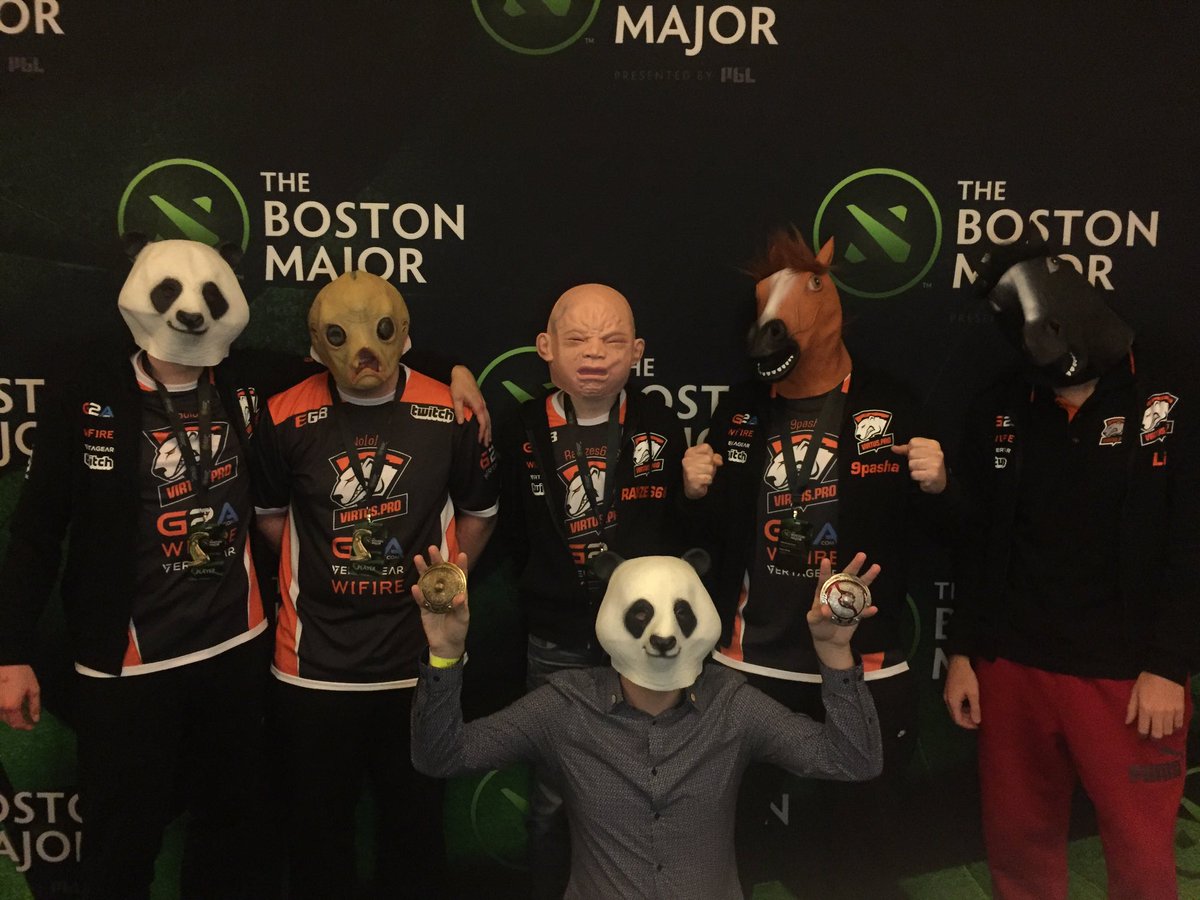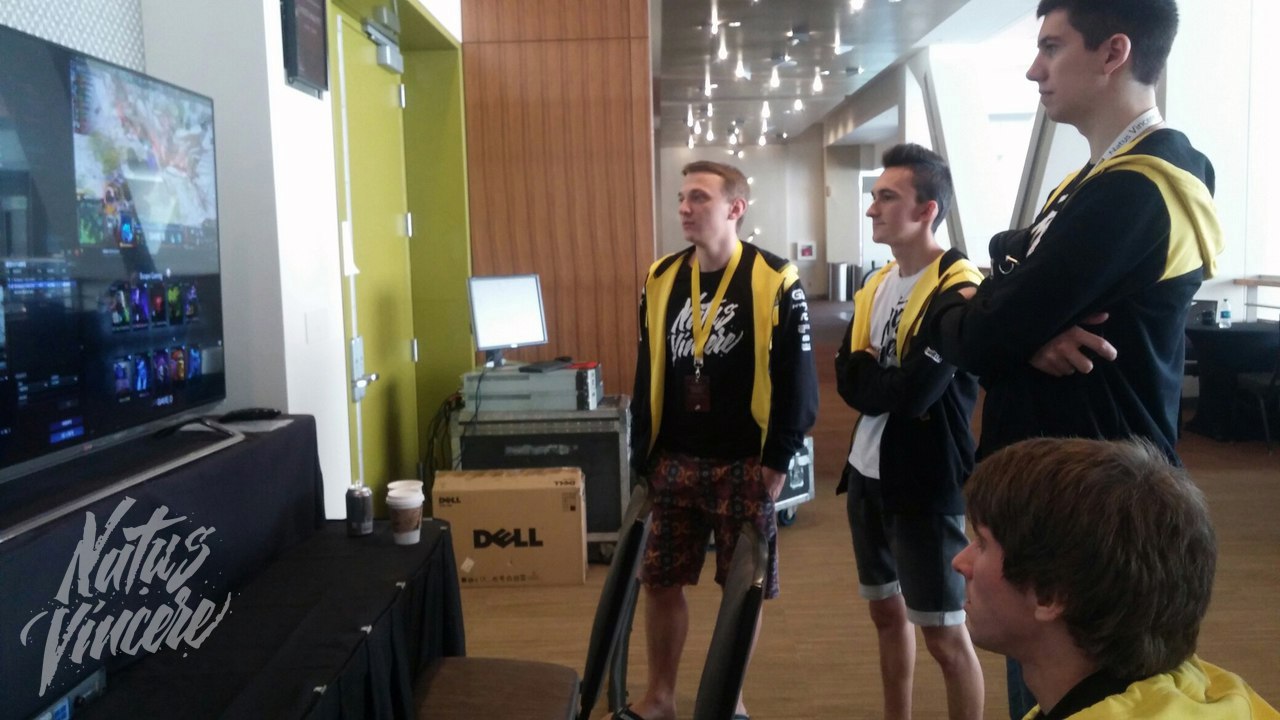ArtStyle: "We have to play a lot, because the enemy is strong"
In a long interview for CyberSport.ru, the coach of our Dota 2 roster answered questions on the team’s playing form, bootcamps, hero pick trends, and the reasons he had left Natus Vincere.

— You used to be a player, and now you’re a coach. How did it happen? When were you invited to Virtus.pro G2A?
— Becoming a coach was a difficult decision for me, seeing as I won’t be winning any more tournaments as a player. Maybe it’s time.
Two months ago, I was sitting there friending people on VK via my acquaintances; Roman (RAMZES666) and Pasha (9pasha) were among them. The following day, they friended me back, and we started talking. Then I talked to Solo, discussed the terms with Roman Dvoryankin, and agreed that we’d try to play the qualifier together, after which we’ll look at the results and decide what next. Maybe it was meant to be.
— Have you finished your career as a player, or can you still go back?
— What I want now is to dedicate all my energy to this team, to these guys. I like them a lot and I believe in them.
— You were without a team for several months. Were you approached by others besides Virtus.pro G2A?
— Sometimes I was offered to play or do other eSports things, but I didn’t have the motivation or the energy. I was aware that if I were to build a team from scratch, it would require a lot of nerves, time and effort.
Here, on the other hand, I joined an existing and well-built team. Everyone at Virtus.pro G2A is a reasonable guy. Frankly, I’ve never seen anything like that in my life. They complement each other well, and are easy and pleasant to work with.
— How quickly did the team recover from the events at the DAC qualifiers?
— The guys were prepared to work without wasting time on things of this sort. Yeah, they’d lost, yeah, connection issues and everything, but one’s got to carry on and keep looking into the future. The International is the goal on everyone’s mind. If players argue with one another, even about small things, everything is resolved quickly. I’d never had that in a team before: instead, everyone would just stick to their guns. Here, though, the guys do have arguments but you can see something come out of those arguments in a matter of ten minutes.

— What form was the team in when you came along? Have you grown a lot over these two months?
— To be honest, two months ago I was thinking a lot about the ways in which I could be useful to this team—and I’m still thinking. I can’t teach the guys: they’re good players to begin with, and experienced too. My only task is to make them into a team and teach them to avoid the mistakes I made in my former teams. I know how not to act.
My aim is to build a team with a good atmosphere. I take part in hero-picking and strategy discussions, but that’s not likely to be very evident in the actual game. The guys have a style of their own, and I don’t want to steal other people’s credit; they were playing very well in the first place. What I’m trying to do is make sure they don’t slump. They told me it was a problem they’d had at large tournaments. And we’ll try to make them feel as confident at Majors and Internationals and whatnot as they did at the [Kiev Major] qual.
— Tell me about Virtus.pro G2A’s bootcamps.
— I was there for the bootcamp in Krasnodar. We decided to leave so that the situation didn’t repeat… And that was the right call.
Frankly I’ve never had bootcamps like these. The guys are placed in good conditions. They don’t think about anything except Dota. They have a cook and a person that cleans up after them and does their laundry. On top of that, the house is very nice; there’s a nice atmosphere, and everyone all but shares the same bedroom: the rooms are close to each other, with two beds in each. Everyone’s talking to someone all the time; people don’t drift away from Dota and into other subjects. And I think that’s a very good thing.
Regarding Moscow, it wasn’t a bootcamp at that point, but a tournament at a gaming café that was secure. The important thing was to play at all, as we had no particular doubt that we’d win. What mattered was that connectivity and external factors didn’t get in our way.
— Was winning the qualifier really that easy?
— Everything went super well. There weren’t really any problems, except for things like someone being noisy behind the wall at the café. After a fortnight at the quiet, comfortable house where we had all we needed close at hand and there was that pure gaming atmosphere, the café was quite a challenge; we had to readjust. It was more like being at a really noisy tournament. But the actual games were quite easy for us, and you all saw that.
— Why did you let Dendi and fn have Magnus?
— Something distracted us during the match against Natus Vincere G2A, and we forgot about that hero… And that was despite us doing everything right up to that point, preparing for every team, thinking through the first picks and bans. Somehow we had a dumb moment with that Magnus.
And as for Empire’s Magnus… That wasn’t about the Magnus or about the Phantom Assassin. We simply had a couple of five-man wipes and were finding it hard to play afterwards. We should’ve used a completely different game plan.
We had discussions about all of that later, of course. Which is why, as I said, it’s very pleasant to work with these guys: they correct every mistake they’ve made, and move on.
— Solo is doing the picking now. What are your drafts like?
— I wasn’t there when RAMZES666 was in charge of picks. Alexey is the captain now, making all the decisions. RAMZES is second in command; they sit down together and discuss everything. The others sometimes help with heroes that they feel will suit them well.

— In some of the matches, you picked heroes you rarely use. Was that impromptu, or planned beforehand?
— At the bootcamp, we’d played many games against strong teams, using many different heroes. We’d practiced every single one of them, except perhaps Venomancer. The guys can play absolutely any hero. They can pick whatever they like at any given moment. This ought to make the opponent very tense, since any hero can appear at any time. You can’t prepare for that and pre-emptively ban them all.
— What can you say about the things No[o]ne has said on Twitter?
Concerning Vova’s recent “easy” tweets… Well, it was a fairly easy game. During the preceding games, I’d been pacing about and fretting a little, whereas in the two final games, the guys showed some strong quality play; they had no doubt they’d win. They were like a machine bearing down on the opponent for 20 minutes. The guys did feel it was easy, and they can write about it if they like.
— As for Lil’s tweets, I have a good opinion of them. We’ve discussed that with Ilya. It’s the kind of hype he needs. If someone’s offended, they don’t have to read it.
— What are your post-qual thoughts about the level Dota is at in the CIS?
— CIS-based Dota is really tired. All the same players, no new ones; just reshuffles upon reshuffles. Virtus.pro G2A is, I suppose, the only team that’s still capable of something.
Everyone’s played with everyone; everyone’s fought with everyone; no-one wants to get back together, and there are no new people. In China, there are a great many schools, many different teams; they pick out newcomers and help them a lot.
But I wouldn’t say North America is stronger than the CIS. compLexity Gaming and Team NP are on par with our Vega Squadron, Team Spirit and Natus Vincere. So how exactly is North America stronger? It’s the same.
And Europe’s in that place too. They’ve got one strong team, and the rest are mediocre. I won’t even mention South America. Only China and the rest of Asia stand out against a background like this.
— In the current patch, the classic strategies that you used in the original Dota are working great. And they did great against CIS teams. But what are you planning to do against world-class teams—OG, Evil Geniuses, the Chinese?
— Those are different enemies and you have to play against them in different ways. Those strategies aren’t likely to work against EG, OG, Digital Chaos or top-tier Chinese teams. From the beginning, we’d been telling ourselves that we had to win this qual giving our opponents no chance. We really needed that victory, so we had to beat everyone in an easy, quick and quality way. We saw the enemy’s weak spots and knew how to hit them. That’s why Chen and Enchantress did so well.
But I can tell you from personal experience that they’re very feeble against OG or EG. Their supports know how to move around and know how to counter these heroes. So basically, we’ll have to play against them a little differently. But no-one among our five players is any less skilled than OG, or EG, or anyone else.
— What do you do if you want to push but both Chen and Enchantress have been banned?
— Dota is so flexible now that you just change your game without missing a beat. How can you push if you don’t have Chen or Enchantress anymore? You just play. You pick them later, when the enemy has misstepped, when they’ve picked weak heroes. It’s then that you roll out Chen and Enchantress—and that’s it, the enemy either has lost already or will pick characters that are supposed to defend against Chen and Enchantress.

— Why did you leave Natus Vincere?
— I was very tired. I wanted to leave after The International 2016 already, but we decided to stay and keep playing together. As a team, however, we were in pieces; communication between us was very poor. In the end, we wasted another two or three months. We realized it couldn’t go on like this. I left and was terribly happy about getting at least a tiny bit of freedom. The pressure to perform had been very strong. It was Na`Vi.G2A, after all: you’ve got to win, you’ve got to try hard. So many haters, so many fans; you can neither let the latter down nor give the former the satisfaction. Yet you’re failing, again and again; and no-one in the team wants to deal with that. And that was how we went our separate ways.
— Who headed the team at the time?
— At that point, no-one. There was no team. When Na`Vi.G2A put together their new lineup, you could feel that “new life” in them. They may not have signed up the most famous players, the best of the best, but they did start to play and win. They went to the DAC EU qualifiers and played against Team Secret as equals. You could feel the spark in them again. Back then, though, it had been a non-team, not worth even discussing.
— After Na`Vi.G2A, you went off the radar for a long time. Were you taking a break from Dota?
— I don’t suppose I can ever let go of Dota. I was watching games, replays, tournaments all the time. I played pub games every now and then, solo or in a party with friends. That’s how I spent my evenings. It was professional Dota that I took a break from: the competitiveness, the nerves, all of that.
— What do you think about Natus Vincere.G2A’s new lineup? Can they make it to the top on the global scene?
— I don’t know. Before I joined Virtus.pro G2A, I used to think it was realistic and fairly easy to pull off. We played, we fought among ourselves, everyone was hating on us, saying I was the worst, and yet we had four second places, one first and two third places in the space of half a year. It wasn’t all that bad.
When I came to Virtus.pro G2A, though, I saw the way these guys played and the way they communicated… Now I’d say the current Na`Vi.G2A lineup has no chance if Virtus.pro G2A play as they’re playing now. It’s a very strong, very good team. It can make it big in the future, provided it doesn’t fall apart.

— How were you able to win the first International?
— We were lucky. We’d put together a good lineup a month before that tournament. ZeroGravity did it; we didn’t even know. He invited Puppey and LighTofHeaveN, if I’m not mistaken.
And why did we play like that? Well, someone had to win that International. It just so happened that we did. I don’t know how to explain it. Everyone was playing more or less equally well. Just like there are top-tier teams now, there were five strong teams back then. It just happened. We just wanted to win.
— Who would you note among lesser-known CIS players?
— Funny thing. It would be good if young people in the CIS did what they do in China. When you have five young folks—or, at most, one older player and four young ones—and you start playing. What we tend to have is three oldies joined by two youngsters. And I can’t say the oldies start teaching them. It’s more like they corrupt them. The young players burn out in no time.
The community and the older players, which is to say all of us together—the weather-beaten old dudes, if you like—can get fiercely obstinate, and yet it’s we who ought to listen to the young, not they to us.
Take CDEC Gaming, the runners-up of The International 2015; their lineup was five young people from China. Or the Wings Gaming lineup: also five young people from China, or perhaps one was older.
— Why don’t you stream?
— I feel uncomfortable both streaming and playing. I find it easier to play five or six pub games with my friends in the evening. It brings me a lot more pleasure than streaming.
As for my media potential—certain people ran it into the ground a long time ago, so I’m not interested.
— What are your team’s plans?
— I’d like to tell fans that they can have calm faith in this team. They’re very responsible folks. They’ll try to make a worthy showing on behalf of the CIS. I’d like to ask everyone who’s going to attend The Kiev Major to root for our guys.
Soon we’re going to Krasnodar to practice again. We’ll prepare for about three weeks, maybe a month. We’ll begin in April. The people and the facilities in Krasnodar give us the maximum amount of comfort. Even when someone is bored or doesn’t feel very good, the guys can talk it over and solve the problem. They’re that good at talking to each other.
We have to play a lot, because the enemy is strong, and we’re the only team from the CIS; we’ve got to fight for our region.